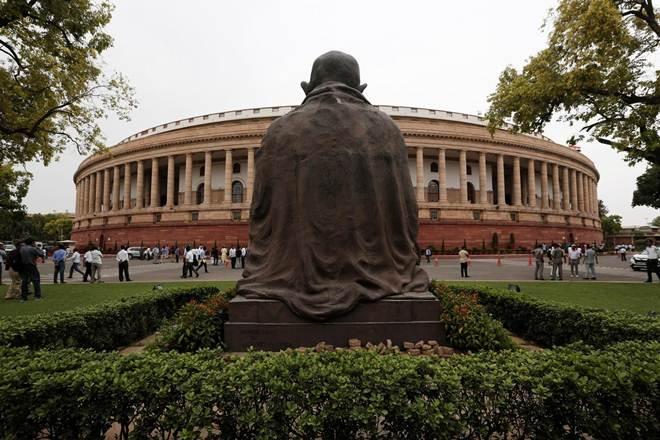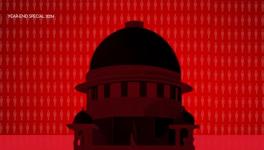UAPA Amendment: Gateway to Misuse Anti-Terror Law, Say Critics

Image Courtesy: The Financial Express
New Delhi: The Unlawful Activities (Prevention) Amendment Bill, 2019, received the Presidential assent on Thursday, August 8. With the Bill finally becoming a law, the government has empowered itself to designate any individual as a terrorist if it believes that the individual has committed or participated in acts of terrorism, prepared for terrorism, promoted terrorism, or is otherwise involved in terrorism. Earlier, only organisations could be designated as terror outfits and its membership and/or support of which was an offence under the UAP Act, 1967.
Now, individuals can be listed as terrorists in the Fourth Schedule to the UAPA, even without establishing their affiliations to any such organisation.
The amended anti-terror law allows the director general (DG) of the National Investigation Agency (NIA) to approve the seizure or attachment of property which is believed to represent the proceeds of terrorism. Earlier, any seizure or attachment required the approval of the director general of police (DGP) of the state in which the property is situated.
The amended act says officers with the rank of inspector of the NIA should be able to investigate terrorist activities and terrorist organisations. Earlier, officers with the rank of deputy superintendent of police (DSP) or assistant commissioner of police (ACP) or above were empowered to probe such offences.
Experts and constitutional scholars allege that the government has opened a gateway to misuse the law by supplying above amendments to the new legislation – which was already controversial. The critics call it a “over-broad and vague” statute.
As per the National Crime Records Bureau (NCRB), 67% of UAPA cases result in the acquittal or discharge of the accused.
“The UAPA extends the amount of time people can be sent to custody without being charged, does not allow anticipatory bail and prevents courts from releasing the accused on bail if the case against them is prima facie true. And therefore, it is considered draconian. Allowing the Centre to designate individuals as terrorists will make matters worse as no commensurate safeguards for this arbitrary power have been introduced,” constitutional expert Gautam Bhatia told NewsClick.
Also read: Parliament Clears UAPA Bill That Gives Power to Govt to Declare Individual as ‘Terrorist’
He also said the new law has allowed the government to accuse people of being members of a terrorist organisation and punish them on “extremely flimsy grounds”.
Though the Supreme Court has tried to prevent this kind of abuse by saying that the membership of a banned organisation must also be accompanied by violence or incitement of violence, yet the order’s implementation has been inconsistent.
“With this amendment, the government has now got a legal sanction to allow indefinite detention of people without trial, without much in the way of evidence,” he added.
The designation process is entirely up to the discretion of the central executive, with no opportunity to be heard before it happens, and once designated, the burden of proof is shifted to the individual/organisation, who has to approach a Review Committee.
‘Bill Violates Article 21 and Article 14’
Advocate Abubakr Sabbaq of the Association for Protection of Civil Rights (APCR) argues that the designation of individuals as terrorists without a fair trial is a “violation of Article 21 (no person shall be deprived of his life or personal liberty except according to procedure established by law) and Article 14 (equality before law) of the Constitution of India”.
“Now, the NIA will no more be bound to follow Article 22 (a safeguard that says every person who is arrested or detained in custody shall be produced before the nearest magistrate within a period of 24-hours of arrest) of the Constitution and the sections of the CrPC (Code of Criminal Procedure). A person can now be designated as terrorist by a government’s notification. He or she will have to prove himself or herself innocent before the probing agency within a period of one month. If investigators reject the arguments of the defendant, he has to approach the Review Committee, which will comprise of ex-judges and bureaucrats. No time period is specified for the committee to give its opinion on the matter. If the Review Committee rules against the person, he or she will have to knock the doors of the Supreme Court,” he said, adding that the NIA has been given immense power, which in all likelihood will be abused and innocent people will be framed and voices of dissent will be suppressed.
Earlier, the government had the power to attach properties but only the judiciary was empowered to declare anyone a terrorist. The NIA had the obligation to inform the local police before conducting any raid, detaining any suspect and calling the person for questioning and there should be diary entry of any such action in the local police station. But the amendment has infringed upon the power of the state police. The NIA can take any suspect on remand for a period of six months. Earlier, it was 30 days (one month).
When this reporter pointed out that several countries such as the United States and the United Kingdom, too, designate individuals as terrorists, Sabbaq said, “But the police or investigating agencies of these nations are accountable to people. They generally do not frame innocents. But in our country, such draconian laws have always been abused and therefore, POTA (Prevention of Terrorism Act) and TADA (Terrorist and Disruptive Activities (Prevention) Act) were repealed.”
Also read: Amendments in Security Legislation and Administrative Tweaks Towards Centralisation
The amended law is in violation of the International Covenant on Civil and Political Rights (ICCPR) and the International Covenant on Economic, Social and Cultural Rights (ICESCR). The two are known as the International Bill of Human Rights.
As far as the ongoing trials in terror cases are concerned, even charges have not been framed in the cases pending for the past eight to ten years in special NIA courts in Delhi and those accused have been languishing in jail. In such cases – he said – there are 200-300 witnesses to prove the prosecution charges.
“I have found while defending several accused that the officer who has lodged the FIR and the IO (investigating officer) who has probed the case do not have proper knowledge of UAPA sections, but the cases go on for year, with the accused being behind the bars. Unable to prove charges, the NIA with an aim to save its face has promoted a new culture of plead guilty. The accused are convinced that they will be released early if they accept the alleged crime which they have not committed. And it is an open secret,” he alleged.
‘Burden of Proof shifted to Accused Individual’
Experts also opined that it would be extremely difficult for individuals, who wouldn’t have the operational structure of an organisation, to approach the Review Committee. “The Bill should ideally have mentioned a separate procedure for individuals. There is no need to designate individuals as terrorists in this manner as global terrorists recognised by the United Nations can already be targeted under Section 51A of the UAPA – the government’s Statement of Objects and Reasons says it needs this amendment to comply with international law. No public consultation was conducted before drafting this Bill as is required under the Pre-Legislative Consultation Policy 2014,” Congress MP Shashi Tharoor had told Lok Sabha during the debate on the Bill.
But Professor DK Singh, who teaches law at Bareilly College, Bareilly, Uttar Pradesh, is against the above objections that it is an infringement of the powers of state police, arguing that if the law and order is a state subject, ensuring country’s security, unity and integrity is Union’s subject. “And therefore, empowering a Central probing agency to prevent terror acts cannot at all be unconstitutional,” he told NewsClick.
Also watch: We Are Surrounded by Jai Shri Ram, Lynchings and UAPA
But at the same time, he said he fails to understand why an inspector rank officer of the NIA has been given the power of investigation instead of the officer of the rank of Deputy Superintendent of Police, Assistant Commissioner of Police and above.
He also asked as to who will take the responsibility to ensure that the amended law is not abused and used as tool to harass an individual.
Anas Tanweer Siddiqui, a criminal lawyer at the apex court, said there should be application of judicial mind, but the Review Committee does not have any sitting judge. “Secondly, now, anyone can be convicted on the basis of intent only. In law, intent and action should be there for conviction. If an individual is being designated as terrorist, all that is required is intent. Earlier, his or her membership with any banned outfit was necessary. How will you prove intent, which is extremely subjective?” he asked.
Talking about the burden of proof, which has been shifted to the individual who is being accused of being involved in terror acts, he said, “In a criminal law, a person is innocent until proven guilty. To prove him or her guilty, the burden of proof was on the prosecution beyond reasonable doubt. How will a person, who is already in jail, prove that he is innocent? The prosecution has all machinery but the individual does not have any apparatus.”
Advocate MS Khan, who has a long experience of working with terror cases, says the individual designated as a terrorist will not have the liberty of a fair trial. “Since he is not being tried in a court of law, there will not be physical presence of witnesses and their cross examination. The entire case will be fought on paper only. The accused lawyer can only find out loopholes in the investigation report of the probing agency and defend his client. It will weaken the chances of acquittal,” he said.
He also said he does not have any hope with the Review Committee as it has no representation of any sitting judge.
Get the latest reports & analysis with people's perspective on Protests, movements & deep analytical videos, discussions of the current affairs in your Telegram app. Subscribe to NewsClick's Telegram channel & get Real-Time updates on stories, as they get published on our website.
























